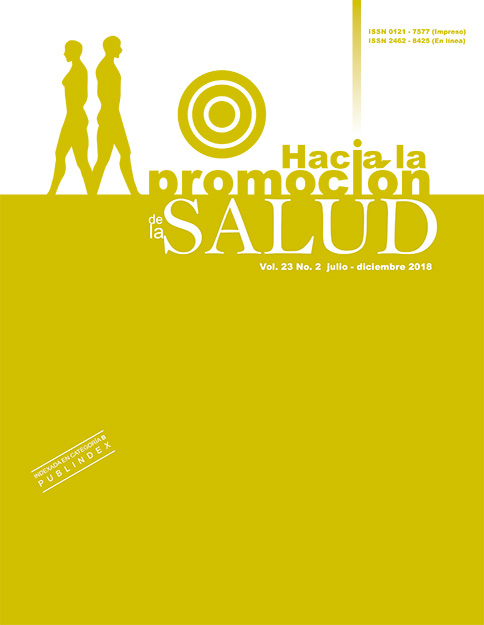Authors
Abstract
Objective: This research aimed to analyze the predictive role of sociodemographic and health variables, self-efficacy and stress in adherence to the treatment of patients with hypertension of a cardiovascular program at a Chilean primary care health center. Materials and Methods: A quantitative correlational study carried out from March to August 2017. The sample consisted of 141 hypertensive patients selected randomly and intentionally. The instruments to collect sociodemographic information and health antecedents were developed, and the Miller Health Behavior Questionnaire, SEMCD-S from the Stanford Patient Education Research Center and Lovibond and Lovibond DASS-21 stress subscale were applied to measure adherence, self-efficacy and stress respectively. For data analysis, measures of central tendency and dispersion, comparison between groups, correlation analysis and multiple linear regression were used with the support of the SPSS software version 21 and R. Results: Total adherence was weakly though significantly related to self-efficacy (r=,224) and negatively related to stress (r=-,170). Age, non- consumption of cigarettes and knowledge that the disease is a chronic condition turned out to be predictors of adherence to treatment. Conclusion: The results reinforce the importance of personal variables as predictors of health behaviors and the role of information and education in adherence to the treatment of people with hypertension. The practical implications of these findings for the functioning of the cardiovascular program are explored.
References
2. Hirschberg S, Donatti S, Rijana I & Selan V. La relación entre adherencia terapéutica y calidad de vida en la hipertensión arterial. PSIENCIA. Revista Latino. 2015; 6(2): 1-8.
3. Martín-Alfonso LDLÁ, Grau-Ábalo JA & Espinosa-Brito AD. Marco conceptual para la evaluación y mejora de la adherencia a los tratamientos médicos en enfermedades crónicas. Revista Cuban. 2014; 40(2): 222-235.
4. Oliva P, Buhring K. Problemas de adherencia a dietoterapia en pacientes hipertensos pehuenches. Revista Chil. 2011; 38(3): 285-289.
5. Moreno J, Rozo M, Cantor M. Permanencia y abandono terapéutico en un centro de servicios psicológicos. Psychologia: Avan. 2012; 6(2): 23-34.
6. Ortiz-Arriagada JB, Castro-Salas M. Bienestar psicológico de los adultos mayores, su relación con la autoestima y la autoeficacia: Contribución de enfermería. Ciencia y Enferm. 2009; 15(1): 25-31.
7. Cid P, Orellana A, Barriga O. Validación de la escala de autoeficacia general en Chile. Revista Médic. 2010; 138(5): 551-557.
8. Carpi-Ballester A, Gonzalez-Navarro P, Zurriaga-Llorens R, Campos M, Carlos J, Buunk AP. Self Efficacy and Perceived Control in the Prevention of Cardiovascular Disease. Universitas Psycho. 2010; 9(2): 423-32.
9. Kreausukon P, Gellert P, Lippke S, Schwarzer R. Planning and self-efficacy can increase fruit and vegetable consumption: a randomized controlled trial. Journal of Behavioral Medicine. 2012; 35(4): 443-451.
10. Byrne S, Barry D, Petry NM. Predictors of weight loss success. Exercise vs. dietary self-efficacy and treatment attendance. Appet. 2012; 58(2): 695-698.
11. Koring M, Richert J, Lippke S, Parschau L, Reuter T, Schwarzer R. Synergistic effects of planning and self-efficacy on physical activity. Health Education & Be. 2012; 39(2): 152-8.
12. Heeren GA, Jemmott III JB, Mandeya A, Tyler JC. Theory-Based Predictors of Condom Use among university Students in the United States and South Africa. AIDS Education & Prev. 2007; 19(1): 1-2.
13. Hughes JR, Naud S. Perceived role of motivation and self-efficacy in smoking cessation: A secondary data analysis. Addictive behav. 2016; 61: 58-61.
14. Olivari-Medina C, Urra-Medina E. Autoeficacia y conductas de salud. Ciencia y Enfermería. 2007; 13(1): 9-15.
15. Cabanach R, Valle A, Rodríguez S, Piñeiro I, González P. Las creencias motivacionales como factor protector del estrés en estudiantes universitarios. European Journal of Educat. 2010; 3(1): 75-87.
16. Sánchez-Cruz JF, Hipólito-Lóenzo A, Mugártegui-Sánchez SG, Yáñez-González RM. Estrés y depresión asociados a la no adherencia al tratamiento en pacientes con diabetes mellitus tipo 2. Atención Fam. 2016; 23(2): 43-47.
17. Sierra J, Ortega V, Zubeidat I. Ansiedad, angustia y estrés: tres conceptos a diferenciar. Revista Mal Est. 2003; 3(1): 10-59.
18. Bedi M, Varshney VP, Babbar R. Role of cardiovascular reactivity to mental stress in predicting future hypertension. Clinical and Experi. 2000; 22(1): 1-22.
19. Wiernik E, Nabi H, Pannier B, Czernichow S, Hanon O, Simon T, Limosin F. Perceived stress, sex and occupational status interact to increase the risk of future high blood pressure: the IPC cohort study. Journal of Hypert. 2014; 32(10): 1979-1986.
20. Veliz-Rojas L. Automedicación y adherencia terapéutica como determinantes del control integral de enfermedades cardiovasculares [tesis para la obtención de grado Doctor en Enfermería en internet]. Chile: Universidad de Concepción; 2014 [citada 2016 Dic]. Disponible en: Disponible en: http://repositorio.udec.cl/bitstream/handle/11594/1725/Tesis_Automedicacion_y_Adherencia.Image.Marked.pdf?sequence=1&isAllowed=y
21. Antúnez Z, Vinet E. Escalas de depresión, ansiedad y estrés (DASS - 21): Validación de la versión abreviada en estudiantes universitarios chilenos. Terapia Psic. 2012; 30(3): 49-55.
22. Ritter PL, Loring K, Laurent DD. Characteristics of the Spanish-and English-language selfefficacy to manage diabetes scales. The Diabet. 2016; 1-11.
23. Tutasig C, Del Consuelo L. Factores personales que influyen en la adherencia al tratamiento de pacientes hipertensos que acuden al servicio de cardiología del hospital Carlos Andrade Marín en el periodo marzo del 2011 [tesis de pregrado para la obtención de título en internet]. Ecuador: Universidad Técnica de Ambato; 2013 [citada 2017 Ago 01]. Disponible en: Disponible en: http://repositorio.uta.edu.ec/handle/123456789/3154
24. Molina DMD, Preval YH, López MLM. Adherencia al tratamiento antihipertensivo en pacientes del municipio San Miguel del Padrón. Revista Cubana. 2014; 48(4): 4.
25. Vergara SC, Almagiá EB. Autoeficacia, apoyo social y adherencia al tratamiento en adultos con diabetes mellitus tipo II. Psicología y Salud. 2014; 24(2): 167-173.
26. Maeda U, Shen BJ, Schwarz ER, Farrell KA, Mallon S. Self-efficacy mediates the associations of social support and depression with treatment adherence in heart failure patients. International Jour. 2013; 20(1): 88-96.
27. Crump C, Sundquist J, Winkleby MA, Sundquist K. Low stress resilience in late adolescence and risk of hypertension in adulthood. Heart. 2016; 102: 541-547.


 PDF (Español)
PDF (Español)
 FLIP
FLIP


























